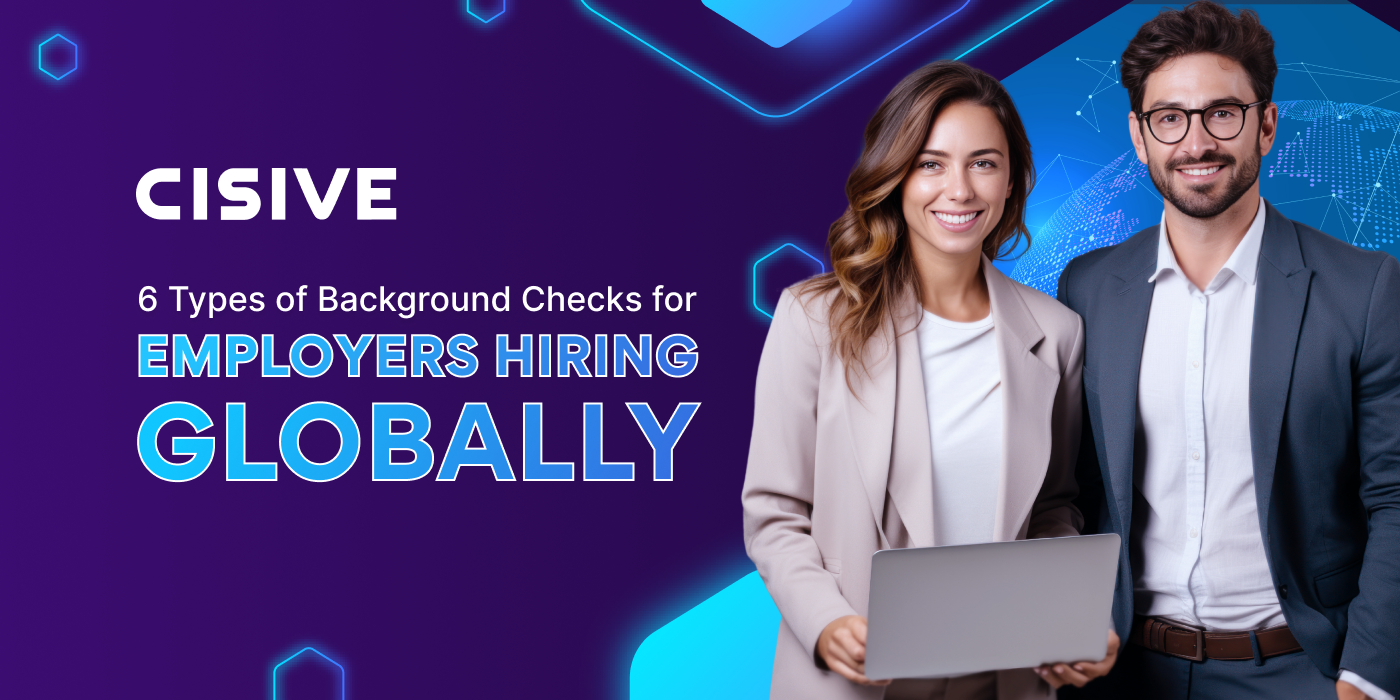
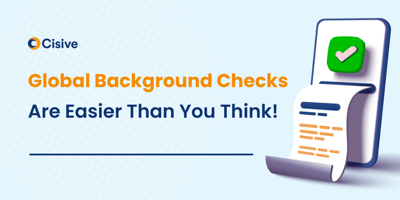
In this Cisive Product Highlight series, we review key tools to consider when screening your...

U.S.-based companies invest trillions of dollars every year in foreign direct investments as they establish or expand operations in other countries. While the opportunities for growth are tremendous, scaling operations in other countries complicates the hiring process — especially when it comes to international background checks.
Discover what’s unique about global background screening processes, the compliance challenges you might encounter, and what to look for in an international background screening partner.
Key Takeaways
|
While the specific background checks you need to run will vary by job role and local regulations, some apply almost anywhere. Here are five common background check types and how they might differ when hiring internationally.
These checks delve into a candidate's criminal history in countries where they’ve lived or worked. An international criminal background check help employers assess a candidate's trustworthiness and minimize risks to the business, employees, and customers.
Country-by-country requirements can differ when conducting criminal background checks. Some jurisdictions might ban them or restrict their use. Take time up front to explore local regulations and determine whether a criminal check is necessary for the role. If so, determine what to screen for and when in the hiring process to conduct the check.
International education verification confirms the authenticity of a candidate's educational qualifications, including degrees, licenses, and certifications. This screening process guarantees that the candidate has the necessary skills and knowledge for the position and that they’ve properly represented their credentials.
For certain degrees and credentials, keep in mind that accrediting bodies differ by location. Nursing education programs in the United States, for example, are accredited by the Commission on Collegiate Nursing Education, but not every program accredited in the U.S. is accredited in other countries, and vice versa. Stay abreast of local requirements in the locations where you’ll be operating.
An employment verification check confirms a candidate's employment history matches what’s been claimed. This check validates job titles, dates of employment, and other information, such as reason for leaving the job.
Verifying employment in another country can be time-consuming and might increase time to hire. Factor this in when opening requisitions, and look to streamline the employment verification process.
Contacting the candidate's professional references, such as former supervisors or colleagues, is crucial for assessing their performance, behavior, and skills.
Reference checks may add time to your hiring process, especially if you’re trying to reach people in different countries and time zones.
One of the most important aspects to any background check is validating the Personal Identifiable Information (PII), such as name, date of birth, and identification number.
Include an identification document validation step to the process, such as ID Check or IDVerity. This can help prevent omitting a candidate’s criminal or financial records. It also may improve the turnaround time and verified rates for verifications.
In certain cases, employers may conduct financial checks, such as credit reports and bankruptcy searches, to evaluate the candidate's financial history and trustworthiness. Financial reports are primarily allowed when hiring for roles that deal directly with money, such as a loan officer.
Financial background checks may be restricted or prohibited in some jurisdictions due to privacy laws. Look for each country’s relevant regulations. In the U.S., the Fair Credit Reporting Act regulates these background checks.
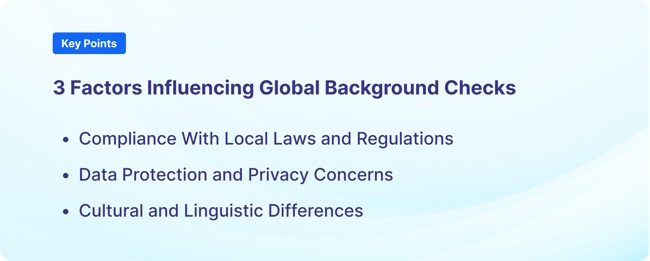
Maintaining background check compliance is already challenging domestically. Adding other countries’ laws and regulations further complicates the process. Here are some factors that could affect international background check compliance efforts.
Employers must be aware of the national laws and regulations governing background checks in each country where they operate, as well as any localized differences within a country. Noncompliance can result in legal penalties, reputational damage, and invalidated hiring decisions.
For example, some countries may prohibit certain types of background checks or restrict which information you can pull on a candidate. Work with your legal counsel, preferably those with localized expertise, to develop a compliant background check process for each jurisdiction.
Data protection and privacy are paramount in international background checks. Some countries have data-protection laws that restrict the collection and processing of personal information. Some countries require consent from affected people before conducting background checks, and some might dictate how that consent is obtained.
Employers must ensure that personal data collected during background checks is handled securely and in accordance with data-protection laws. This includes implementing appropriate data security measures, obtaining consent, and providing individuals with access to and control over their personal data. Failure to adequately protect personal data can lead to breaches, identity theft, and legal liability.
Cultural and linguistic differences can also affect international background checks. Language barriers, for example, can make it difficult to communicate with individuals and obtain accurate information. Some countries have multiple official languages, which could affect how employers communicate verbally and in writing with candidates.
As needed, consider the use of interpreters or language translation services to make sure each candidate understands their rights and can consent to the process.
Hiring in other countries requires an understanding of applicable laws and regulations. Here are common types of laws and regulations that can affect your international background check process.
Data protection and privacy laws vary from country to country. These laws typically require employers to obtain consent from individuals before conducting background checks. They often impose requirements for handling and protecting personal data. Some also give individuals access to and control over their personal data. Here are some common laws governing data privacy in other countries.
General Data Protection Regulation (GDPR): GDPR applies to organizations processing personal data of individuals within the European Union (EU). It governs data collection, processing, storage, and transfer, and provides individuals with extensive rights regarding their personal data. Under GDPR, companies must obtain consent from individuals before collecting and processing personal data. Companies must protect data from unauthorized access or disclosure.
Personal Information Protection and Electronic Documents Act (PIPEDA): PIPEDA is a Canadian data-protection law that regulates the collection, use, and disclosure of personal data. It requires organizations to obtain consent from individuals before collecting their personal information. PIPEDA also imposes data security requirements on organizations.
Employment laws and regulations also impact the background check process. In some countries, employers must provide a valid reason for conducting certain types of background checks, such as criminal checks. Some jurisdictions restrict the use of certain background checks or ban them entirely. Employers must also be aware of laws governing how background check results are used in hiring decisions.
In Canada, for instance, drug and alcohol testing is largely prohibited. If used, employers must present a strong case connecting the results of the test to potential danger in the workplace. Similarly, many Asia-Pacific countries have strict laws regarding criminal background checks, with an emphasis on gaining a candidate’s consent before running checks.
Anti-discrimination laws prohibit employers from using background check results to discriminate against individuals based on protected characteristics, such as race, gender, religion, national origin, age, or disability. Employers must ensure that their background check policies and procedures are fair and nondiscriminatory.
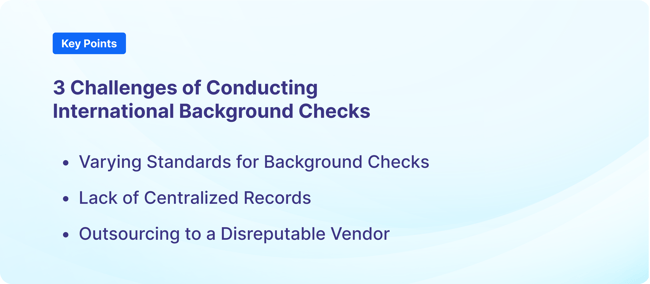
Effective international background screening programs require employers to proactively address compliance obstacles. Here are a few challenges you might encounter.
What constitutes “relevant” information for screening candidates can change drastically from one jurisdiction to another. This makes it difficult to create a standardized background check process for all countries.
Consider developing a background check process that accounts for the strictest requirements across all countries where you’re hiring. Taking this approach helps you be consistent across locations while remaining compliant with a patchwork of local laws.
Another challenge is the lack of centralized records in many countries. Even when countries do have a centralized criminal record system, for example, access is often restricted. This can make it difficult to obtain accurate and up-to-date information on job candidates.
Time zone differences and communication issues can also complicate background checks, especially when you’re trying to obtain background check records manually and in house. This responsibility can burden your hiring team and extend your time to hire.
The most effective way to counter this problem is to work with a background screening partner that’s versed in international hiring practices. They can locate and obtain the right information quickly and properly.
Some background check service providers lack the necessary experience or expertise to conduct international background checks properly. This can lead to inaccurate or incomplete reports, which can have serious consequences for employers.
If an employment screening service provider outsources background checks, for instance, you could be on the hook for transferring personal identifying information (PII) across borders. This could lead to legal consequences and reputational damage.
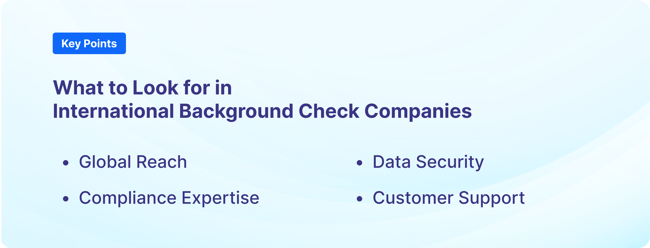
Employers don’t need to create international background screening processes by themselves. Here are some features to look for in a trustworthy background check partner.
Verify that a potential partner has a track record of compliance in the countries or regions where you operate. Look for a provider with a well-established network of local partners and resources. Make sure they have the expertise needed to navigate each jurisdiction’s distinct laws, regulations, and cultural nuances.
Compliance expertise is another critical consideration. Any partner should show how they keep track of the latest developments in data protection and privacy regulations. They should also showcase how they adhere to the highest standards of data security and confidentiality.
Look for certifications from groups such as the Professional Background Screening Association or membership in other relevant industry associations that demonstrate their commitment to compliance.
Data security measures are paramount when handling sensitive personal information. Evaluate a potential partner’s security infrastructure, including encryption protocols, access controls, and incident response plans. Make sure they have a plan for safeguarding data throughout the entire background check process, including in transit.
Customer support plays a vital role in providing a smooth and efficient background check process. Opt for a company that provides dedicated customer support with knowledgeable representatives who can help you throughout the process.
Look for customer service teams with clear communication channels, prompt response times, and a proactive approach to addressing problems or concerns.
International background check services are crucial for any business operating on a global scale. As companies expand their operations into additional countries, they must continue to make strong hires who don’t pose undue risks. And they must do so while avoiding legal and compliance risks.
This is where the right background screening partner can make all the difference. By partnering with a reputable company that specializes in international background checks, domestic employers can confidently and compliantly scale their operations. Such partners have the knowledge, resources, and expertise to navigate the complexities of different legal systems and cultural norms. At every turn, these partners provide reliable and accurate information about potential hires.
By choosing the right background screening partner, employers can rest assured that they are making informed hiring decisions internationally while expanding their operations in a responsible and compliant manner.
Want to learn more? Schedule a call with one of our background screening experts.
Author: Shannon Fortner
Bio: Global Solutions Director, Product Management at Cisive.
Let's Connect on LinkedIn
In this Cisive Product Highlight series, we review key tools to consider when screening your...

There are hundreds of background check companies, but not all of them offer a robust international...

Globalization and outsourcing have led many US-based organizations to expand their business...